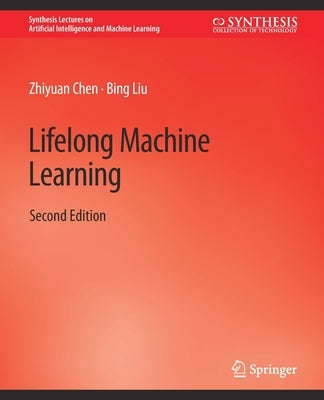Description
Lifelong Machine Learning, Second Edition is an introduction to an advanced machine learning paradigm that continuously learns by accumulating past knowledge that it then uses in future learning and problem solving. In contrast, the current dominant machine learning paradigm learns in isolation: given a training dataset, it runs a machine learning algorithm on the dataset to produce a model that is then used in its intended application. It makes no attempt to retain the learned knowledge and use it in subsequent learning. Unlike this isolated system, humans learn effectively with only a few examples precisely because our learning is very knowledge-driven: the knowledge learned in the past helps us learn new things with little data or effort. Lifelong learning aims to emulate this capability, because without it, an AI system cannot be considered truly intelligent.
Research in lifelong learning has developed significantly in the relatively short time since the first edition of this book was published. The purpose of this second edition is to expand the definition of lifelong learning, update the content of several chapters, and add a new chapter about continual learning in deep neural networks--which has been actively researched over the past two or three years. A few chapters have also been reorganized to make each of them more coherent for the reader. Moreover, the authors want to propose a unified framework for the research area. Currently, there are several research topics in machine learning that are closely related to lifelong learning--most notably, multi-task learning, transfer learning, and meta-learning--because they also employ the idea of knowledge sharing and transfer. This book brings all these topics under one roof and discusses their similarities and differences. Its goal is to introduce this emerging machine learning paradigm and present a comprehensive survey and review of the important research results and latest ideas in the area. This book is thus suitable for students, researchers, and practitioners who are interested in machine learning, data mining, natural language processing, or pattern recognition. Lecturers can readily use the book for courses in any of these related fields.
Author: Zhiyuan Chen, Bing Liu
Publisher: Springer
Published: 08/14/2018
Pages: 187
Binding Type: Paperback
Weight: 0.81lbs
Size: 9.25h x 7.50w x 0.44d
ISBN13: 9783031004537
ISBN10: 3031004531
BISAC Categories:
- Computers | Artificial Intelligence | General
- Mathematics | Applied
About the Author
Zhiyuan Chen completed his Ph.D., titled ""Lifelong Machine Learning for Topic Modeling and Classification,"" at the University of Illinois at Chicago under the direction of Professor Bing Liu. He joined Google in 2016. His research interests include machine learning, natural language processing, text mining, data mining, and auction algorithms. He has proposed several lifelong learning algorithms to automatically mine information from text documents, and published more than 15 full research papers in premier conferences such as KDD, ICML, ACL, WWW, IJCAI, and AAAI. He has also given three tutorials about lifelong machine learning at IJCAI-2015, KDD-2016, and EMNLP-2016. He has served as a PC member for many prestigious natural language processing, data mining, AI, and Web research conferences. In recognition of his academic contributions, he was awarded Fifty For The Future Award from the Illinois Technology Foundation in 2015.Bing Liu is a Distinguished Professor of Computer Science at the University of Illinois at Chicago. He received his Ph.D. in Artificial Intelligence from the University of Edinburgh. His research interests include lifelong machine learning, sentiment analysis and opinion mining, data mining, machine learning, and natural language processing. He has published extensively in top conferences and journals in these areas. Two of his papers have received 10-year Test-of-Time awards from KDD, the premier conference of data mining and data science. He has also authored three books: one on Web data mining and two on sentiment analysis. Some of his work has been widely reported in the popular press, including a front-page article in the New York Times. On professional services, he served as the Chair of ACM SIGKDD from 2013-2017, as program chair of many leading data mining related conferences, including KDD, ICDM, CIKM, WSDM, SDM, and PAKDD, as associate editor of many leading journals such as TKDE, TKDD, TWEB, and DMKD, and as area chair or senior PC member of numerous natural language processing, AI, Web research, and data mining conferences. He is a Fellow of the ACM, AAAI, and IEEE.
This title is not returnable

